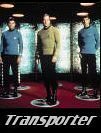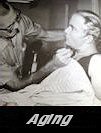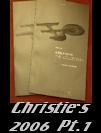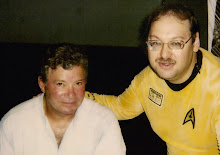As told by Robert Justman, Co-Producer of TOS, and presented in his book "Inside Star Trek: The Real Story" (Pocket Books, 1996) which was co-authored with Herb Solow, Desilu's executive in charge of production for Star Trek.
Although Gene Roddenberry was brilliant in creating unusual concepts and story ideas, he practiced every imaginable technique to avoid one of his primary responsibilities, that of rewriting scripts. His days were filled with story and script conferences, and he was always immediately available to approve costume designs, prop designs, hair designs, and whatever network and production matters "desperately" required his attention. At the eleventh hour, however, he'd finally begin rewriting, which almost always meant Roddenberry was still at his desk when the morning sun rose over Hollywood.
Star Trek's famous opening narration came about under the pressure of an approaching crucial deadline.
BOB: On August 1, 1966, with the season premiere set for September 8, only weeks away, I prodded Gene to write the show's opening narration. But as usual, he continued to procrastinate. With only a few days left to ship the premiere episode to NBC for broadcast, it was now or never. The episode was complete except for this necessary and long-promised element.
Finally goaded into action, Gene took a stab at writing it, incorporating Sam Peeples's pilot title, "Where No Man Has Gone Before." He sent his first version to John Black and me. Gene asked for our comments and contributions. After an exchange of memos, he incorporated some of the suggestions into what became Captain Kirk's famous opening narration.
Justman's memo asking Roddenberry to write the narration ...
Roddenberry's first rough draft ...
Roddenberry's revised draft ...
Black's suggested version ...
Black's shorter version ...
Justman's suggested version, with Roddenberry's handwritten annotations ...
Justman's demand that Roddenberry deliver his final draft ...
On the afternoon of August 10, 1966, literally minutes after Gene finished his final version, I phoned Bill Shatner on stage, where he was working on "Dagger of the Mind", our ninth episode to be filmed. I told him to "drop everything", and then I ran across the street to the dubbing stage. Bill raced to meet me and arrived a minute later, slightly out of breath. We rehearsed the dialogue several times and made a take. Due to Bill's classical training, his delivery was excellent -- but the narration sounded too contemporary. There was something lacking; it didn't seem to "ring out".
I asked the sound mixer to add reverberation to Shatner's voice. We made another take and the results were perfect. Bill had become Captain Kirk, the adventurous commander of a spacecraft of the future, when he declared:
Space ... the final frontier. These are the voyages of the Starship Enterprise, its five-year mission:
... to explore strange new worlds ...
... to seek out new life and new civilizations ...
... to boldly go where no man has gone before.
Welcome! As part of its ongoing mission to document the Art and Production History of Star Trek, this site will present technical articles on Star Trek prop and costume authentication - focusing on The Original Series - with detailed photos and episode screenshots to complement the information presented; as well as feature pictorials to showcase Star Trek memorabilia in private & public collections, present rare Behind The Scenes TOS imagery & discuss other topics.
Gerald Gurian is a 40+ year collector of screen used Star Trek memorabilia and a passionate fan of TOS

|
||
| - Star Trek TOS At Auction Part I | - Gurian Collection Highlights | - Greg Jein TOS Hero Type II Phaser |
| -Authenticating a TOS Communicator | -6 Myths About Star Trek Prop Design | -Star Trek 3rd Season Command Tunic |
| - Design Features of TOS Tricorders | -Star Trek Props At National Air & Space | - TOS Leatherette Tricorder |
| - TOS Federation Sciences Dress | -Desilu Studio TOS Prop Fabrication | - Unreleased Allen/Gurian Prop Photos |
| - The Beautiful Women of TOS Part I | -TOS U.S.S. Enterprise 11' Filming Model | - Captain Kirk's Chair from TOS |
| - Spock Ears | -TOS Control Panels & Displays | - Mr. Spock's Science Station |
| - TOS Soundstage at Desilu | -TOS Shatner Romulan Pants | - The Beautiful Women of TOS Pt. II |
| - TOS Galileo Shuttlecraft | -Greg Jein TOS Cage Laser Pistol | - TOS 3rd Season Midgrade Type II Phaser |
| - Dr. McCoy's Sickbay on TOS | -TOS Balok Puppet Head | - Captain Kirk "Mirror, Mirror" Tunic |
| - Greg Jein TOS Hero Tricorder | -1992 Smithsonian TOS Cast Video | - TOS 1st Season Command Tunic |
| - TOS "Where No Man" Silver Contact Lenses | -TOS Special Effects: The Transporter | - The Art of Matt Jefferies |
| - TOS "Space Seed" Gold Mesh Jumpsuit | -Gorn Costume from "Arena" | - Rare TOS Behind-the-Scenes Videos |
| - TOS Stunt Type II Phaser | -1993 Bill Theiss Estate Auction | - TOS Shatner Command Dress Tunic |
| - TOS Elasian Royal Guard Tunic | -TOS Finnegan Silver "Shore Leave" Tunic | - TOS Science Officer Tunic "The Cage" |
| - TOS Shatner Early 1st Season Command Tunic | -William Shatner TOS Tunics At Auction | - TOS Shatner Late 1st Season Command Tunic |
PLEASE NOTE: To see an enlarged version of any photo inside any article, just move your mouse cursor over the image and left-click.
Subscribe to: Posts (Atom)
About Me
Blog Archive
-
▼
2010
(95)
-
▼
June
(12)
- Heritage Auction Galleries Entertainment Memorabil...
- Abrams Star Trek XI U.S.S. Enterprise Captain's Chair
- Abrams Star Trek XI Romulan Phaser Pistol
- Abrams Star Trek XI Klingon Disruptor Rifle
- Abrams Star Trek XI Kelvin Bridge Chair
- Abrams Star Trek XI Medical Tricorder
- Abrams Star Trek XI Communicator
- Abrams Star Trek XI Starfleet Sciences Uniform
- Abrams Star Trek XI Kelvin Starfleet Uniform
- Abrams Star Trek XI Starfleet Cadet Uniforms
- Profiles Star Trek Auction - June 12, 2010 - Final...
- The History of Star Trek: The Original Series - Cr...
-
▼
June
(12)
|
|
|
THE ORIGINAL SERIES |
|
1st Pilot - The Cage |
|
Landing Party Props |
|
Starfleet |
|
Alien |
|
PHASE II |
|
MODERN SERIES TOS-STYLE |
|
STAR TREK: TNG |
|
STAR TREK: DS9 |
|
STAR TREK: VOYAGER |
|
STAR TREK: ENTERPRISE |
|
STAR TREK: DISCOVERY |
|
STAR TREK: PICARD |
|
STAR TREK FEATURE FILMS |
|
|
|
THE ORIGINAL SERIES |
|
William Shatner |
|
Leonard Nimoy |
|
DeForest Kelley |
|
James Doohan |
|
Nichelle Nichols |
|
Majel Barrett |
|
Starfleet |
|
Star Trek: The Exhibition Main Cast |
|
Aliens |
|
PHASE II |
|
MODERN SERIES TOS-STYLE |
|
STAR TREK: TNG |
|
STAR TREK: DS9 |
|
STAR TREK: VOYAGER |
|
STAR TREK: ENTERPRISE |
|
STAR TREK: DISCOVERY |
|
STAR TREK: PICARD |
|
STAR TREK FEATURE FILMS |
|
|
|
THE ORIGINAL SERIES |
|
STAR TREK: TNG |
|
STAR TREK: DS9 |
|
STAR TREK: VOYAGER |
|
STAR TREK FEATURE FILMS |
|
|
|
THE ORIGINAL SERIES |
|
MODERN SERIES TOS-STYLE |
|
STAR TREK: TNG |
|
STAR TREK: ENTERPRISE |
|
STAR TREK FEATURE FILMS |
|
STAR TREK: THE EXPERIENCE |
|
|
|
TOS HISTORICAL LISTINGS |
|
MAJOR STAR TREK EVENTS |
|
HERITAGE AUCTIONS |
|
THE PROP BLOCK |
|
PROPSTORE |
|
PROFILES IN HISTORY |
|
PROPWORX |
|
SCREENUSED |
|
NOTEWORTHY AUCTIONS |
|
|
|
DOCUMENTS |
|
TOS SPECIAL EFFECTS |
|
RARE TOS VIDEOS |
|
RARE TOS PHOTOS |
|
RAW LINCOLN FILM CLIPS |
|
INSIDE STAR TREK FANZINE |
|
NON-TOS |
|
|
|
THE ORIGINAL SERIES |
|
STAR TREK: TNG |
|
STAR TREK: ENTERPRISE |
|
STAR TREK FEATURE FILMS |
|
NOTEWORTHY VIDEOS |
|
|
|
TO BOLDLY GO BOOKS |
|
SIMULATED BRIDGE |
|
SITE RELATED |
|
WILLIAM SHATNER |
|
LEONARD NIMOY |
|
1992 SMITHSONIAN |
|
ST REBOOT FILMS NEWS |
|
STAR TREK CONVENTIONS |
|
Creation Las Vegas 2010 |
|
Creation Las Vegas 2013 |
|
Creation Las Vegas 2014 |
|
Creation Las Vegas 2015 |
|
THESE ARE THE VOYAGES - TOS |
Star Trek is a Registered Trademark of CBS Studios Inc.
Any material belonging to CBS/Paramount or others Copyrighted Material that may appear on this website complies with fair and/or acceptable use for the purposes of review, study, criticism, or news reporting.
All evaluations and conclusions here are the sole opinion of the author and do not constitute any formal legal declarations. While every effort has been made to post accurate information; it is offered for your reading enjoyment only.
This site uses cookies from Google to deliver its services, to personalize ads and to analyze traffic. Information about your use of this site is shared with Google. By using this site, you agree to its use of cookies. LEARN MORE
This website is not endorsed, sponsored or affiliated with CBS Studios Inc. or the "Star Trek" franchise. The STAR TREK trademarks and logos are owned by CBS Studios Inc.


























































































